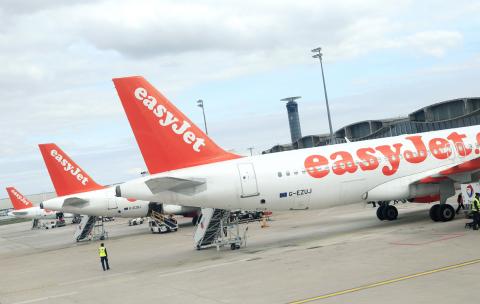EasyJet PLC agreed to buy 135 Airbus SAS jets worth about US$13.22 billion at list price as Europe’s No. 2 low-cost carrier upgrades its fleet, risking an open confrontation with its founder, who has opposed the purchase.
EasyJet will take 35 current-generation A320s for delivery between 2015 and 2017, and 100 new-engine A320neos from 2017 to 2022, the Luton, England-based company said yesterday. The airline also has options to purchase 100 additional A320neos.
EasyJet is buying larger, more fuel-efficient airliners to replace old jets, helping boost seat capacity by as much as 5 percent annually. The agreement sets up a potential clash with founder and largest shareholder, Stelios Haji-Ioannou, who has been a vocal critic of a fleet upgrade and has demanded that management focus on profitability rather than growth.

Photo: AFP
“This is a great outcome for EasyJet, our shareholders and our passengers, and will ensure that EasyJet is able to continue its successful strategy of delivering profitable growth and returns to shareholders,” EasyJet chief executive officer Carolyn McCall said in a statement.
The deal, which is subject to shareholder approval, comes three months after larger rival Ryanair Holdings PLC agreed to buy 175 Boeing 737 jets worth US$15.6 billion at list price. Both Boeing Co and Airbus offered compelling new-generation jets with improved fuel efficiency, in a “highly competitive fleet selection process,” McCall said.
“Ultimately, Airbus offered us the best deal, and at a price with a greater discount to the list price than their landmark fleet purchase with EasyJet in 2002,” she said.
Airbus’s January list price for the current-generation A320s is US$91.5 million and US$100.2 million for the A320neo. Customers typically buy airliners at a discount. Stakeholders will be asked to approve the deal at a general meeting held at EasyJet’s Luton headquarters on July 11.
While ranked second to Ryanair among Europe’s low-cost airlines, EasyJet has dropped its early no-frills approach in favor of a model that offers ancillary services like lounge access and flexible tickets to draw corporate traffic. The move comes as network carriers including Deutsche Lufthansa AG and BA-parent IAG SA trim short-haul capacity. EasyJet attracted 10 million corporate travelers last year.

To many, Tatu City on the outskirts of Nairobi looks like a success. The first city entirely built by a private company to be operational in east Africa, with about 25,000 people living and working there, it accounts for about two-thirds of all foreign investment in Kenya. Its low-tax status has attracted more than 100 businesses including Heineken, coffee brand Dormans, and the biggest call-center and cold-chain transport firms in the region. However, to some local politicians, Tatu City has looked more like a target for extortion. A parade of governors have demanded land worth millions of dollars in exchange

An Indonesian animated movie is smashing regional box office records and could be set for wider success as it prepares to open beyond the Southeast Asian archipelago’s silver screens. Jumbo — a film based on the adventures of main character, Don, a large orphaned Indonesian boy facing bullying at school — last month became the highest-grossing Southeast Asian animated film, raking in more than US$8 million. Released at the end of March to coincide with the Eid holidays after the Islamic fasting month of Ramadan, the movie has hit 8 million ticket sales, the third-highest in Indonesian cinema history, Film

Taiwan Semiconductor Manufacturing Co’s (TSMC, 台積電) revenue jumped 48 percent last month, underscoring how electronics firms scrambled to acquire essential components before global tariffs took effect. The main chipmaker for Apple Inc and Nvidia Corp reported monthly sales of NT$349.6 billion (US$11.6 billion). That compares with the average analysts’ estimate for a 38 percent rise in second-quarter revenue. US President Donald Trump’s trade war is prompting economists to retool GDP forecasts worldwide, casting doubt over the outlook for everything from iPhone demand to computing and datacenter construction. However, TSMC — a barometer for global tech spending given its central role in the

Alchip Technologies Ltd (世芯), an application-specific integrated circuit (ASIC) designer specializing in server chips, expects revenue to decline this year due to sagging demand for 5-nanometer artificial intelligence (AI) chips from a North America-based major customer, a company executive said yesterday. That would be the first contraction in revenue for Alchip as it has been enjoying strong revenue growth over the past few years, benefiting from cloud-service providers’ moves to reduce dependence on Nvidia Corp’s expensive AI chips by building their own AI accelerator by outsourcing chip design. The 5-nanometer chip was supposed to be a new growth engine as the lifecycle